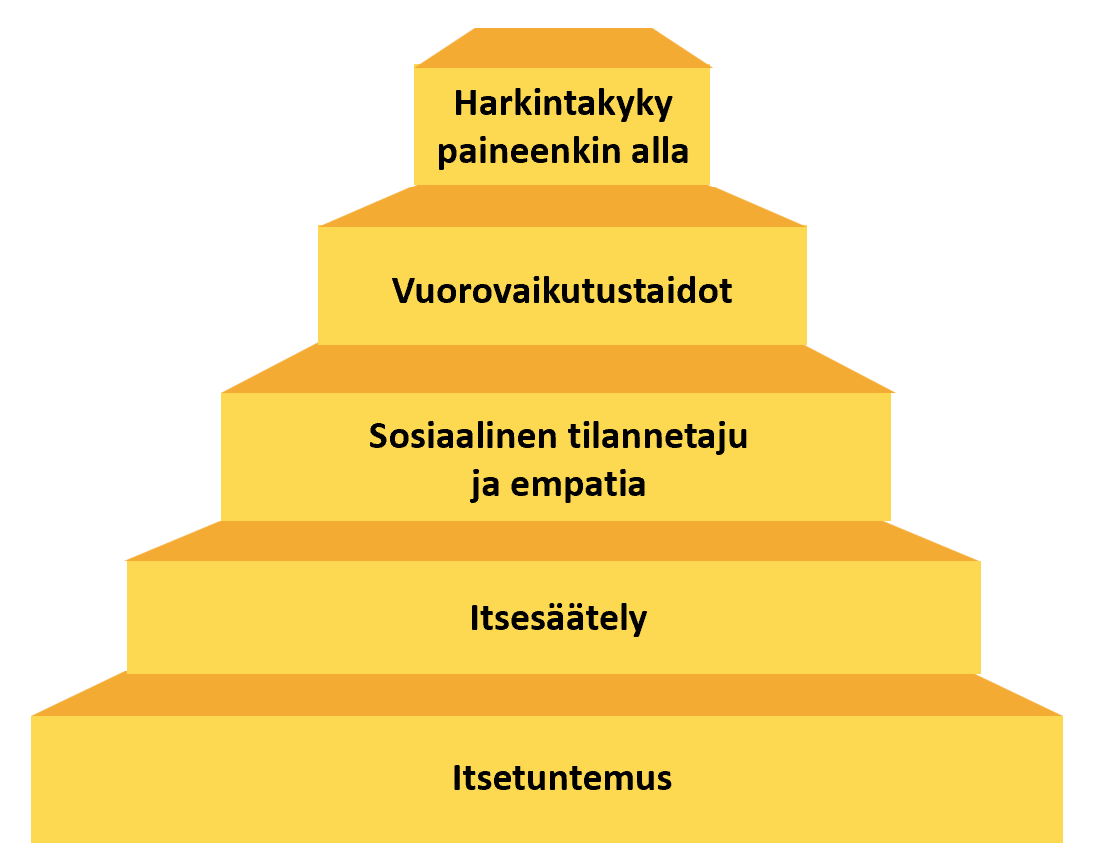Emotional skills in the background of resilience and well-being at work

Resilience, according to most researchers, is built on basic confidence to survive/learn/have a better tomorrow, etc., as well as emotional skills: self-knowledge, emotional regulation and self-control, as well as social skills. Resilience is mental flexibility, reorientation and the ability to recover, because life also includes a spiral ball. It is perseverance to sit through uncomfortable feelings and unfinished processes. It contains the capacity to face surprising challenges and awkward interactions without losing balance. Keep track of how many potentially stressful situations you can cope with during the week! In general, we humans tend to notice our own emotional regulation deficiencies more than our skills.
When I talk about resilience, I talk about the protective factors of mental well-being reasonable against the load. In recent years, amid a wide range of concerns, the load from the exterior has not remained within the bounds of reasonableness. Therefore, now if ever, it is worthwhile in the workplace to correct all the factors that increase the load, which in the work community, together with reflection, are identified and can be influenced by yourself. Likewise, it is important to cherish things that are important for one's own well-being, relationships, sleep and leisure.
In the same way, the resilience of the working community (and, for example, the family) is the ability to face surprising situations and changes without the group losing their basic duties or losing their ability to function, a sense of basic security and togetherness. Strengthening the resilience of the working community means strengthening emotional skills at the individual level and fostering a culture of interaction that supports functional structures, good management and well-being at work and quality work. There's more on that in another blog.
The importance of emotional skills in working life has been studied
Emotional skills are associated with higher resilience in nurses, for example ! 1 and the cops ! 2People who encounter surprises and stressful situations at work every shift. Emotion skills are related to e.g. job satisfaction, job performance, physical and mental health, satisfaction in relationships, quality of managerial work, experience of a sense of control ! 3 ! 4 ! 5 and to a lower stress level ! 6. Emotional skills are also linked to, for example, successful conflict handling, empathy and team skills. ! 7 . The emotional skills of the foremen are associated with the increased resilience of the staff ! 8. Based on TalentSmart, which has provided emotional skills coaching for twenty years to Fortune 500 companies, self-knowledge, self-regulation, social situational awareness, and relationship-building skills determine 58% of people's performance at work, regardless of industry and task ! 9.
Emotional skills as a process
We “Iselians” put aspects of emotional skills on the stairs to remind us that they are built on each other. For example, it is difficult to regulate emotions and reactions that you do not yet recognize. The art of self-soothing is an art of its own. If you fail to regulate your emotions adequately, many interaction situations become challenging. In the midst of intense emotions, it is difficult to hear the messages of others as they mean and respond appropriately. Social situational awareness and the ability to empathize require recognizing the feelings and intentions of others. Since we know how the other person feels by getting his or her emotional state into our own body, it is essential to know which emotions are one's own and which are captured from the other. In order for the soup to be perfect, the emotional reactions of the other (words, behavior, body language) raise in oneself the counter feelings and reactions of the body. Especially everything that violates the sense of security, such as contempt and disrespect, disregard, panic and anger, causes our own body to react and the brain to focus on survival. Therefore, those who work in challenging interaction situations for a living and work that requires an emotional encounter are particularly strong. They must be able both to regulate their own emotions and those that are transmitted to others, to produce emotions appropriate to situations in their minds and bodies, and to act in a constructive way in order to be able to regulate the emotional reactions of the other — for example, to calm the anxious person or to give the anxious person the feeling that he or she is heard and understood. And at the same time, you still have to be able to do your real work. Let's talk about demanding interaction work. In English, the term emotion-labor jobs is used.
For the sake of the self, intermittent conscious pausing is worthwhile
The ability to think and evaluate one's own thoughts, beliefs, attitudes, and emotions is the foundation of one's own functioning, emotion, and stress regulation skills. For example, beliefs and attitudes taken from one's own experience history influence which emotion arises first in a situation. I use as a simple thought game about the power of beliefs and attitudes about a granny who goes to the forest to pick berries and comes up against a bear. What is Grandma's likely reaction? What if a nature photographer goes into the woods and sees that same bear? Or a hunter? — What “bears” do you recognize in your own world of thought? If, after a little reflection and challenging yourself, you still agree, stick to it. As long as you are aware of your input angles to situations.
Self-awareness and emotional regulation are central to the “tracking skill” of one's own triggers. In some situation or in the company of a certain person, you may find yourself reacting surprisingly strongly, but you can't quite figure out why. Then there is usually some “tentacle” of one's own history in the background, which brings feelings of the past into the present situation as well. Suddenly you find yourself in confusing situations. One coaching client decried a recurring work situation where she found herself disproportionately annoyed by a colleague's well-intentioned attempts to help. Eventually, she began to lose her peace of mind from just thinking about her colleague, until she realized that her ex had acted in a very similar way. There was an ex for other reasons, but the trigger subsided and the next time the client was already able to relate more with humor. You can't change your history of experience, but the tentacles to the present fade as you identify. That Sherlock Holmes -- hats on and after clues!
Self-awareness is also knowing one's own strengths and development goals, value bases, and the security factors of one's personal well-being, of which being flexible for longer is not healthy. Where do you charge your batteries? List all the important things that come to your mind and choose the ones you can't negotiate. Cherish them in particular.
Also list your motivational factors in the same way. According to the widely studied theory of SDT motivation, a person is motivated when he experiences an adequate sense of belonging, autonomy and competence in something ! 10. Think about what they include in your specific case? If you answer, for example, that you are a good close person, specify in more detail what kind of actions, interaction styles, etc. make someone a “good” foreperson in your opinion. And what does your answer tell you about yourself and your values? What do you need to be able to decide independently so that autonomy -- your bucket of needs is full enough?
Emotional skills develop throughout life and can be consciously strengthened in themselves
In essence, it is about studying life, humanity and oneself. Emotional skills develop through interaction with others throughout life, watching movies and reading books, attending a concert and listening to one's own thoughts, working with people, process training, job counseling, and, of course, therapy. In this age of reporting on mental health problems, it is important to realize that not everyone needs psychotherapy. Emotional skills are strengthened in psychotherapy, but as a treatment for illness. Conscious reinforcement of emotional skills is not therapy. Occupational health has only become what is directed to those burdened at work, and there are often no other options available. Of course, good preventive work can be done there, but unfortunately the consequences are often treated and perceived as the treatment of an individual's illness. Job counselling, on the other hand, is traditionally focused on the employee, the work and the work community, and for reasons of austerity it is usually in a group format, leaving personal self-awareness and emotional regulation skills superficial. However, learning and change require deeper curious reflection and conscious emotional experiences in sufficiently secure interactions. There is 1:1 MindGuard Coaching in EASEL Training to fill the gap between occupational health brief psychotherapy and occupational counseling. Experiential EASEL Supervisor and Leader process trainings have been specially developed for emotional skills training, with individual supervision as part of a (small) group process.
Developing self-awareness is about gently reflecting on who I am and what happens when I interact with others in different situations. You don't get ready in one life and it's not worth striving for perfection, but maybe a little more skillful every once in a while. It's comforting to think that we humans will be toddling up the same stairs a little bit more every time the situation is new. That's where they get stronger. According to some researchers, emotional skills peak around the age of 60, when you wait for it, but emotional skills can and should also be consciously trained when you want to both succeed at your job, feel good and take good care of your loved ones ! 11 ! 12 ! 13. If understanding your own emotional reactions, arranging your thoughts or tracing the effects of your own experience history on the present seems laborious, there are professional ball walls and tour guides for that to train as a sherlock yourself. Often a few coaching sessions are enough.
Tell me how we can be of help!
Mari
All EASEL Training's trainings, trainings and online trainings combine the researched effective elements of emotional skills training and we also monitor the effectiveness together with our clients as they wish.

